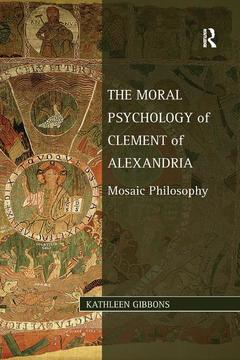The Moral Psychology of Clement of Alexandria Mosaic Philosophy Studies in Philosophy and Theology in Late Antiquity Series
Auteur : Gibbons Kathleen

In The Moral Psychology of Clement of Alexandria, Kathleen Gibbons proposes a new approach to Clement?s moral philosophy and explores how his construction of Christianity?s relationship with Jewishness informed, and was informed by, his philosophical project. As one of the earliest Christian philosophers, Clement?s work has alternatively been treated as important for understanding the history of relations between Christianity and Judaism and between Christianity and pagan philosophy. This study argues that an adequate examination of his significance for the one requires an adequate examination of his significance for the other.
While the ancient claim that the writings of Moses were read by the philosophical schools was found in Jewish, Christian, and pagan authors, Gibbons demonstrates that Clement?s use of this claim shapes not only his justification of his authorial project, but also his philosophical argumentation. In explaining what he took to be the cosmological, metaphysical, and ethical implications of the doctrine that the supreme God is a lawgiver, Clement provided the theoretical justifications for his views on a range of issues that included martyrdom, sexual asceticism, the status of the law of Moses, and the relationship between divine providence and human autonomy. By contextualizing Clement?s discussions of volition against wider Greco-Roman debates about self-determination, it becomes possible to reinterpret the invocation of ?free will? in early Christian heresiological discourse as part of a larger dispute about what human autonomy requires.
Acknowledgements
Note on Translations
Introduction
Chapter 1: The Mosaic Law in early Christianity
Chapter 2: Miming Moses: Clement’s Self-Presentation and the Dependency Theme
Chapter 3: Moses, Statesman and Philosopher
Chapter 4: The Logos of God, the Problem of Evil, and Clement’s Transformation of Providence
Chapter 5: Right Reason and the Gnostic’s Grasp of the Mosaic Law
Chapter 6: Clement’s Idiosyncratic Concept of Autonomy in the Context of Ancient Thought
Conclusion
Bibliography
Index
Kathleen Gibbons received her PhD from the University of Toronto, and subsequently taught at Wilfrid Laurier University. She is a lecturer in religious studies and classics at Washington University at St Louis, Missouri, USA, and studies the intersections between ancient philosophy and early Christian discourse on topics including astrology, ethnography, and asceticism.
Date de parution : 12-2019
15.6x23.4 cm
Date de parution : 09-2016
15.6x23.4 cm
Thèmes de The Moral Psychology of Clement of Alexandria :
Mots-clés :
Mosaic Law; Early Christians; mosaic; Young Man; law; Stoic Ideas; stoic; Human Kind; ideas; Diogenes; early; Mosaic Philosophy; christian; Follow; philosophy; Creation Of The World; tripartite; Transcendent Forms; tractate; Adversus Judaeos; justin; De Post; Deter Minism; Adversus Marcionem; Cosmic City; Paradigmatic Cause; Clement’s Construction; Marcion’s Views; En 1104b11-13; Plato’s Thought; True Martyrdom; Early Christian Representations; Ancient Ethical Thought; Cosmogonic Myth; Early Christian Discussions



